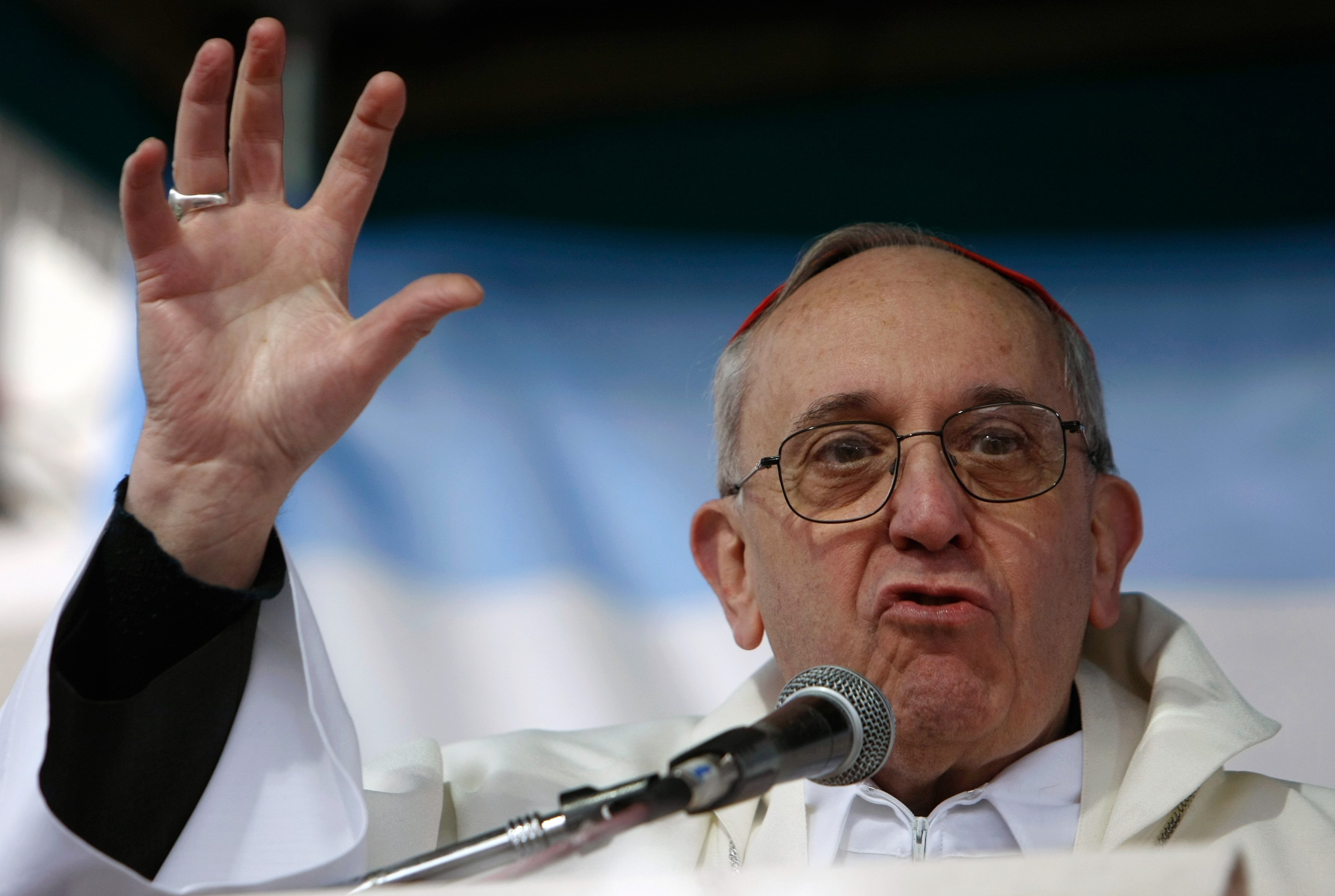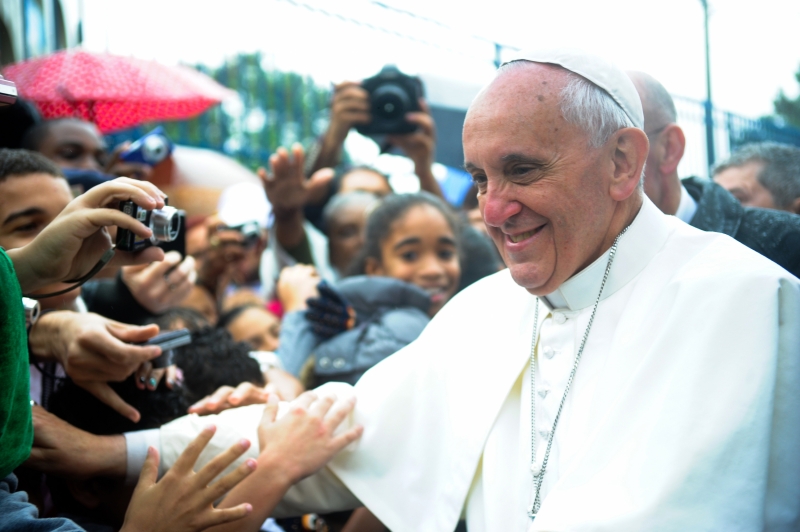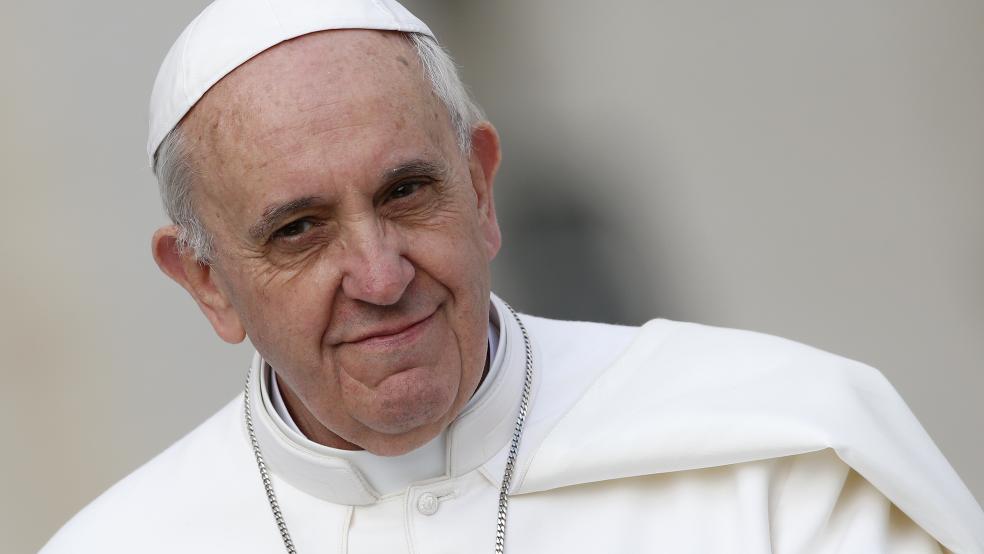Pope Francis, who is visiting the United States for the first time, is something of a global rock star. He’s earned the attention, or at least the curiosity, of many around the world—non-Catholics, feminists, and scientists—not otherwise in the habit of looking to the Vatican as a source of moral authority.
In a 2013 New Yorker profile, historian James Carroll, a former priest and current distinguished writer in residence at New York University, writes that Francis had “unilaterally declared a kind of truce in the culture wars that have divided the Vatican and much of the world.” It’s a truce that Carroll argues has held, even despite criticism of Francis from conservatives miffed by what they perceive as a break from Church orthodoxy and liberals eager to see him make doctrinal changes to match his seemingly radical statements.
Related: From Bouncer to Pope: 21 Fascinating Facts About Pope Francis
When asked about gay priests in July 2013, Francis famously replied “Who am I to judge?”—striking a compassionate note that set him apart from his predecessor, Pope Benedict XVI, who wrote that homosexuality was “a strong tendency ordered toward an intrinsic moral evil.” Time magazine named him Person of the Year for 2013.
This past summer, Francis once again shocked the world with an encyclical that endorsed what he described as the “very solid scientific consensus” that humans, through burning fossil fuels, are responsible for climate change and drew connections between environmental catastrophe and global poverty, calling out those of us who over consume, to the detriment of those in the developing world.
And just last month, he announced that Catholic women who’ve had abortions can confess and receive forgiveness—stopping short of endorsing the right to choose, Carroll notes, but also breaking with bishops who’ve routinely compared abortions to the Holocaust.
These bold statements may have come with a cost: A July Gallup poll found that the pope’s US approval rating had fallen to 59 percent from its 2014 peak of 76 percent (itself a remarkable figure, given that Francis had inherited a Church marred by the international scandal of widespread child sexual abuse by priests). Still, Carroll suggests, the pope—any pope, love him or hate him—is in some sense the ultimate global celebrity.
NYU writer Eileen Reynolds checked in with Carroll to see what we might expect from the pope’s US visit—and his papacy.
Q. What is it about this Pope that has so captured the world's interst, in a secular age, even among non-Catholics?
A. I would say there’s a deep historical reason, and also maybe a more immediate one. The deep history reason goes back to the roots of Western culture. For better and for worse, the pope is the last personal embodiment of Christendom, of that culture. So it’s not like the secretary general of the United Nations, which is an invention of the enlightenment. What other figure is there, besides the pope, who has these hidden roots into the psyche of the West?
"He's the ultimate celebrity."
The second thing he epitomizes big time is the much more contemporary phenomenon of celebrity culture. He’s the ultimate celebrity. He has a costume, he has paraphernalia, he has a palace—and so the fact that he chooses not to be in that palace is astounding.

Francis is a tough character. He’s no pushover, obviously, but he’s nice. Before this nobody would say “nice” about a pope. Pope Benedict was famous for being not nice. He was a stern enforcer of Catholic discipline and doctrine.
But one might argue that being “nice” doesn’t make a difference in the everyday lives of Catholics in the same way that formal changes to the Church’s policy on, say, issues like homosexuality and divorce might.
I think that we’re mistaken to draw a hard and fast distinction between style and substance. And my simple point about Francis—it’s obvious in lots of ways—is that style is substance, and that this refusal to be judgmental opens a way of thinking, an attitude, that has to impact the way in which the Church holds to doctrine.
Q. What does it take for Catholic doctrine to change? How much power does the Pope have over it?
A. My conservative critics would now throw on the table the claim that Catholic doctrine doesn’t change. But back when I was born, which was a long time ago by one clock but not so long ago by another, the official doctrine of the church was: No salvation outside the Catholic Church. Popes going all the way back to the 12th century solemnly declared that again and again: If you’re not a Catholic, you can’t go to heaven. But now it’s gone.
In the 1960s, the fathers of the Second Vatican Council while they claimed they were changing no doctrines—just like Pope Francis—said the only thing that determines salvation is the person acting according to “the dictates of their conscience.” So overnight this idea that there’s no salvation outside the church—boom. Gone.
Doctrine changed. Why? Because of the experience of the Catholic people, who by the middle of the 20th century were not living in little isolated enclaves but marrying people who were not Catholic and had having children who were not Catholic. They understood that God can’t possibly have such a checklist, and the doctrine changed.
Q. What has Pope Francis done-or not done-to address the sexual abuse crisis that has driven so many people from the church?
A. Well, the bishops and Pope Francis have a long way to go on that. Pope Francis has done the beginning of what needed to be done. He’s instituted a process by which bishops can be held accountable. The biggest scandal of the priest sex abuse crisis in my view—well of course it was always that priests would do such a thing to children. But the next biggest scandal was that while a small percentage of priests were abusers, 100 percent of bishops protected abusers instead of the children. And that’s being addressed now, by a mechanism by which bishops are held to account when they don’t adhere to the civil guidelines and to the Church’s now strict guidelines.
But this is just the beginning of what needs to happen. It’s not enough to denounce the problem—you have to undercut the roots of the problem, and that Francis has barely begun to do. The way in which priests are considered above other people, a culture apart—Francis is already undercutting that stuff.
Priestly celibacy, the ordination of women, treating divorced people as full members of the community—a lot of these issues he’s put in play, and will be raised when he goes to Philadelphia [for the World Meeting of Families].
Q. About the ordination of women--won't that question have to be fully addressed if the church is to survive in the modern world?
A. The Catholic Church isn’t the only big institution that’s having trouble reckoning with the feminist revolution, which boils down to the recognition that gender equality is essential for the future of the human species. Is the Catholic Church actually going to survive as an institution of a billion-plus people devoted to gender inequality? I don’t think so. Will the Catholic Church be one of the few humanist institutions to basically say no the civil rights of women? I don’t think so.

Now, how we get from this late-medieval misogynist culture of male supremacy to gender equality in the Catholic Church, I can’t actually predict. But it’s already happening, right in front of us. Women in the Catholic Church over the last generation have taken charge over their own reproductive lives. Seventy-five percent of Catholic women around the world and 80 to 90 percent in the US and Europe use birth control—they’re not waiting for the bishops to approve them.
It’s a little more complicated when it comes to who says mass, because the order of the church authorizes certain people to do that. There are Catholic groups that are unauthorized to have mass who are doing it anyway, but it’s important that the central institution of the church authorize women to say mass. That’s the great emblem of gender equality, and I’m convinced it’s coming. And it’s not unthinkable that Pope Francis could do it.
There was even speculation after he was elected, back when he was announcing new members of the so-called college of cardinals, that he was going to name some women, because theologically you don’t have to be a priest to be a cardinal. More has changed in the last 50 years in the Catholic Church than had changed in the previous 500 years. Who’s to say what’s going to change over the next 20 or 30?
Q. What is the significance of Francis being the first Jesuit Pope?
A. The Jesuits are a great treasure of the Church. One of the big questions is: Do you have to surrender your brain to believe in God, and to believe in religious tradition? A lot of American religion is not committed to rationality, which is why in the United States there’s so much trouble with science—a majority of Americans don’t accept evolution.
Above all, what the Jesuits represent is a serious commitment to intellectual sophistication and education. They basically define their mission by it, with their thousands of educational institutions not just in this country but around the world.
Theology has to submit to the test of reason. When Pope Francis, as a Jesuit, was elected pope, that was my first thought: He’s coming right out of this very positive tradition of the Church.
Q. Why do you think the Pope is visiting the United States now, and what issues might he address while he's here?
A. If the issues he already addresses as pope are threads tied in a knot, that knot, for better or worse, is in the United States. Global inequality is one of his biggest issues, and the global economy is centered in the United States.
We know that inequality in our own country has surfaced as a political issue, but it’s a global issue that threatens the future of the species. I’m not just talking about Wall Street now, but also about the political structures in America are crucial to the world economy. So that’s one thing, I’m sure.
Then, of course, the pope’s encyclical on climate change earlier this summer is the larger context for this visit, both to Washington and to the United Nations.
Q. Does the Pope actually have sufficient power to influence world politics when it comes to slowing a global crisis like climate change?
A. Well, it’s an uphill battle for anybody at this point, because of course we’re way behind on what we should have been doing on carbon emissions. Whether the pope’s enthusiastic embrace of this question will make a big difference or not, who’s to say?
It’s important because many of the most staunch deniers of the climate change problem in the United States are Catholics. John Boehner is a Catholic. Jeb Bush is a Catholic. I think it’s good for the pope to be aggressive on pushing this. His encyclical on climate change last summer was an astonishment. It was his world view, and I think it’ll be hard put for him to publish anything more important.
The analogy I would draw would be to the moment in the early 1980s when the world woke up in a shocking way to the threat of nuclear war. At that time, Ronald Reagan, the new president of the United States, had his finger on the button and seemed to be itching to press it.
The Catholic Bishops of America condemned the theory of nuclear deterrence, condemning the basic strategy of American Nuclear power. Within two years the US congress passed a freeze resolution. Reagan was forced to step back from the nuclear arms race. That was the result of a world movement that involved important religious figures, including Catholics.
No expert predicted that the cold war could end nonviolently. It was unthinkable. And yet it did. No expert today predicts that we’re going to get through this climate change thing without a serious catastrophe. But we’ve seen surprising turns in history in our own lifetimes—and popes and bishops have been part of it, amazingly.




